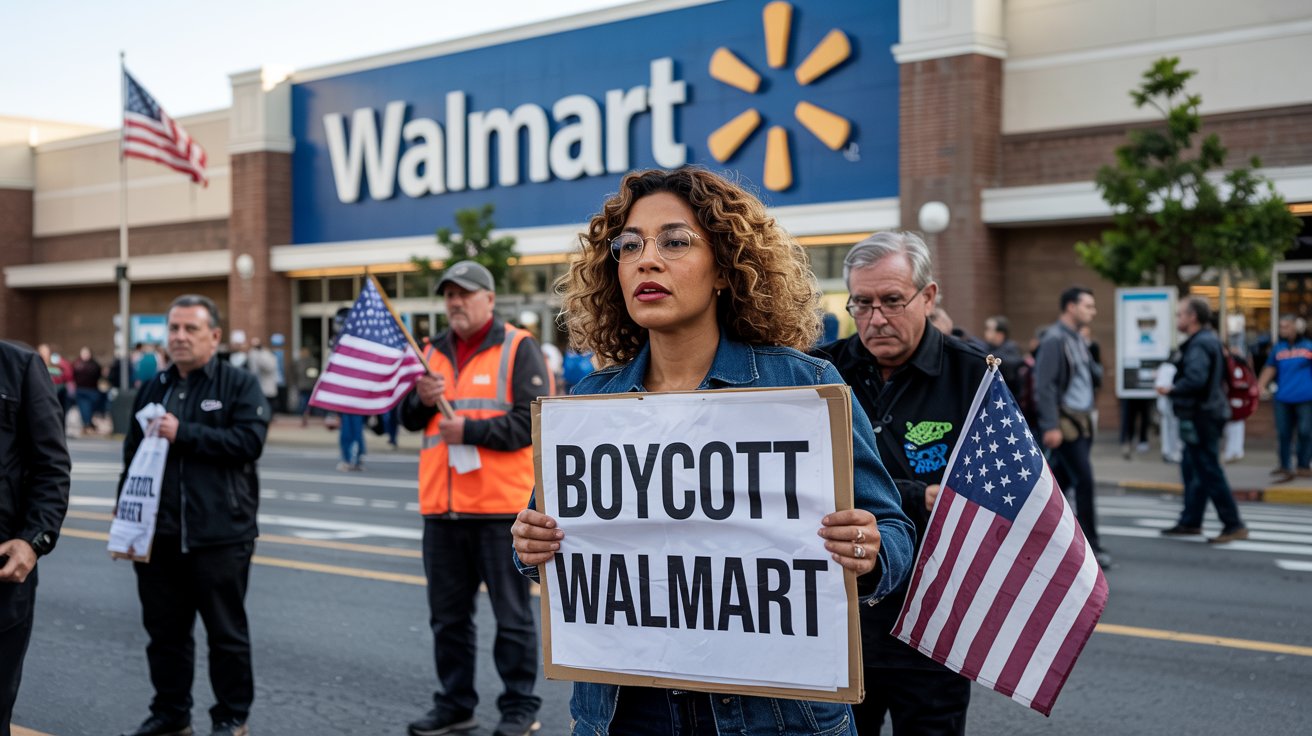Walmart Boycott Explodes Nationwide: Americans Furious Over Tax Loopholes and Rising Prices — this powerful headline has triggered a major consumer backlash as thousands of Americans rally against what they call unfair corporate practices. With rising prices on everyday goods and claims of avoiding U.S. taxes, Walmart is now at the center of a growing national protest.
1. What Sparked the Walmart Boycott?
Shoppers across the U.S. have joined a weeklong protest known as the Retail Blackout, held from April 7 to April 14, 2025. The movement, led by advocacy group People’s Union USA, was launched in response to two major issues:
- Accusations that Walmart avoids over $1 billion annually in taxes through legal loopholes.
- Sharp price hikes on essentials, including groceries, despite record profits.
This combination of corporate tax practices and price increases has deeply frustrated everyday consumers, especially those relying on affordable shopping during times of inflation.
2. Breaking Down the Tax Avoidance Allegations
A detailed report from Americans for Tax Fairness explains how Walmart uses complex international financial structures and subsidiaries to reduce its U.S. tax obligations. While these tactics may be legal, they’ve triggered outrage among consumers who feel large corporations should pay their fair share.
3. Comparing Price Changes: Is Walmart Still the Cheapest?
Consumers are beginning to realize that Walmart no longer offers the best value. Below is a comparison of key items between Walmart and local discount chains in April 2025.
Walmart vs Local Grocery Store Pricing
| Item | Walmart Price (USD) | Local Store Price (USD) |
|---|---|---|
| White Bread (loaf) | $2.79 | $1.99 |
| Milk (1 gallon) | $4.65 | $3.89 |
| Eggs (dozen) | $5.49 | $4.29 |
| Rice (5 lb bag) | $6.98 | $5.25 |
| Laundry Detergent | $14.95 | $11.40 |
This table shows a clear pattern: Walmart’s prices are consistently higher, eroding its reputation as the go-to for affordable shopping.
4. How Social Media Amplified the Movement
On platforms like Facebook, TikTok, and Reddit, the #BoycottWalmart hashtag has gained strong traction. Users are sharing receipts, alternatives to Walmart, and encouraging followers to redirect their spending. The momentum of this digital protest has helped turn the boycott into a national conversation.
- Viral videos on TikTok comparing price receipts.
- Facebook groups organizing support for local alternatives.
- Reddit threads discussing tax avoidance by major U.S. corporations.
5. Walmart’s Official Response and Public Reaction
In a statement, Walmart claimed to be one of the largest corporate taxpayers in the U.S. and highlighted its contributions to job creation and community development. However, many Americans remain unconvinced, calling for greater transparency and accountability.
Analysts say this protest could significantly impact Walmart’s public image, especially if the boycott sustains momentum or returns in waves.
6. What the Boycott Means for Everyday Americans
The Walmart boycott isn’t just about one company. It represents a shift in how consumers view their purchasing power and how they want major corporations to behave.
Key Implications:
- Encouragement to support local and smaller businesses.
- Renewed public pressure for fair corporate taxation.
- Rising consumer activism in shaping corporate policy.
Conclusion: A Sign of Changing Consumer Power
The Walmart boycott highlights a new era in consumer behavior — one driven by transparency, fairness, and social accountability. With rising prices and credible allegations of tax avoidance, Americans are taking a stand, and the effects could be long-lasting.
This movement is a clear sign that U.S. consumers are becoming more informed and more powerful. What starts as a weeklong protest could very well become a permanent shift in shopping habits — and a challenge for Walmart to regain public trust.
[USnewsSphere.com / af.]





